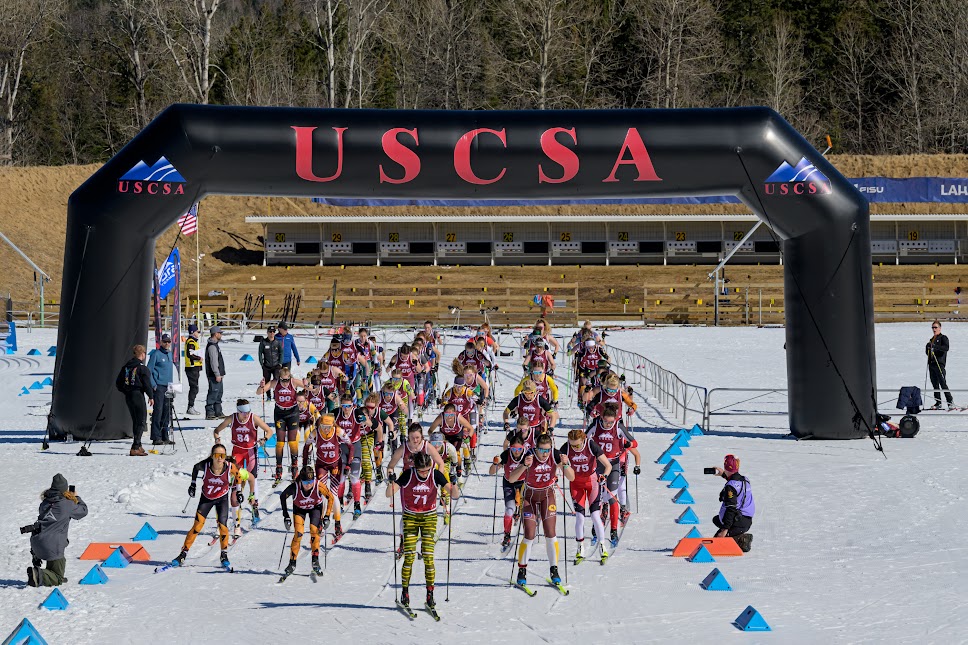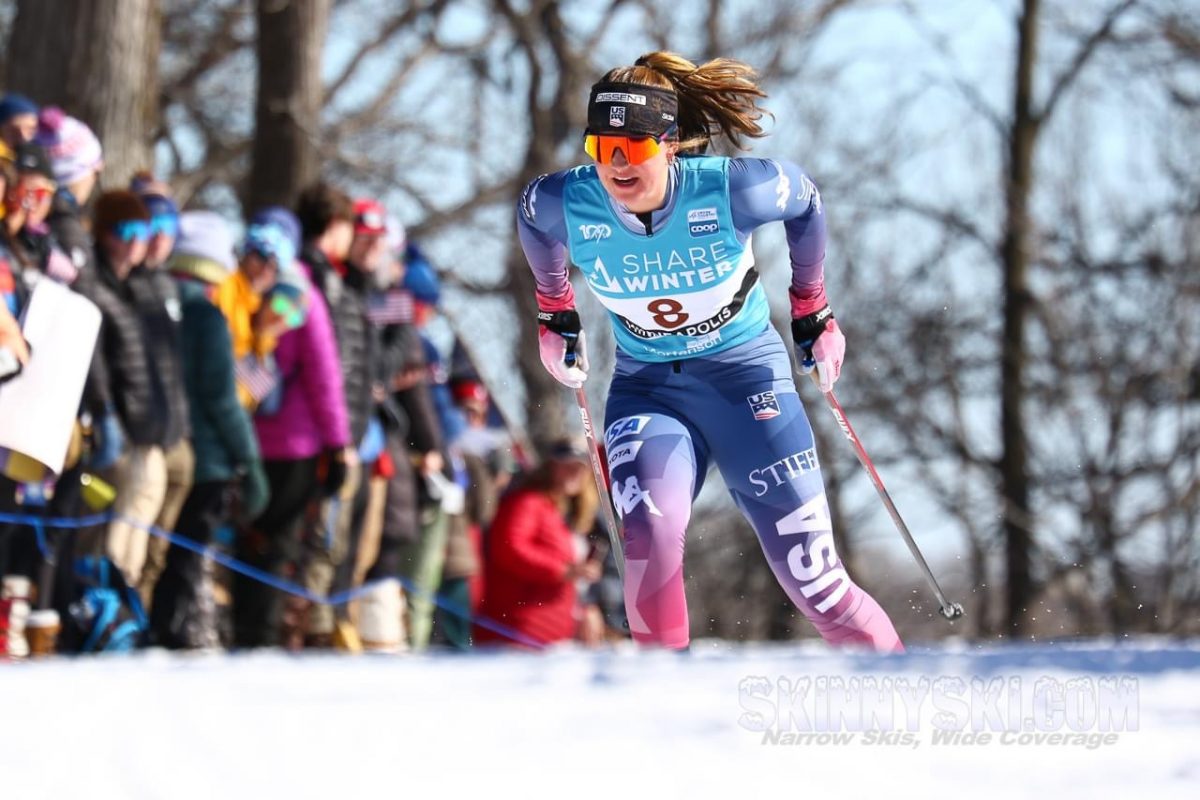FasterSkier had the chance to catch up with Corey Schwartz, Head Ski Coach of University of New Hampshire (UNH) to get some of his thoughts on skiing. Schwartz has been the head director of the UNH ski program for 25 years, during which he has mentored 27 student-athletes to 37 All-American team selections.

He himself skied as a Wildcat for three NCAA Championship teams, and as coach served for both the Eastern USSA Sr. Committee and Chairman of the NCAA Committee. Schwartz is a Level II Certified Coach and has been named Coach of the Year by the Eastern Intercollegiate Skiing Association four times.
FasterSkier: It seems that you went from a Wildcat skier to a UNH coach pretty quickly. What prompted your decision to stay at UNH and how has it been?
Cory Schwartz: It was my 5th year here – I had an internship at UNH when Buzz Davis [my college coach] asked me to help out with the men’s ski team. Back then, men’s and women’s programs were split, and I was asked to be on staff for the men’s side. I got involved because it was my goal to possibly keep ski racing. Paul Burton and Buzz then left soon after, so before I knew it, I liked what I was doing. You get rewarded with seeing your athletes grow over time, who they become. It also gives me time to tweak the men’s program.
FS: What are some of the biggest challenges your athletes face? They are making a big step/transition on deciding to compete on the NCAA level- how do they deal with that?
CS: I do not view it as a challenge, but more as the next step in progress. They have already made the step to become a student-athlete in high school. At home, you have parents to remind you about your training hours, your homework time, your engagements and appointments. When they leave the house and keep that student-athlete set up, they have made that decision. That’s their biggest challenge, of realizing their day-to-day decisions are important. If they decide to go out, that is their decision on how it impacts their training. They are adults now, and are expected to make adult decisions
FS: You have had some impressive skiers continue on after college- Patrick Weaver and Marcus Nash as Olympians, and most recently Dylan McGuffin of the Craftsbury Green Racing Project. How was it building those athletes to pursue professional skiing- what discussions did you have with them?

CS: We have quite a number of Olympians come through UNH. Patty Ross [Middlebury Assistant Coach] and Marty Hall [former Bowdoin Head Coach] are two that came through our ski program. Robel Teklemariam was also one, although he was unique since he was the only non-American to compete in the Olympics [for Ethiopia]. I have had very good relationships with my alumni, and after 20 years it’s been very rewarding. Soon I’m going to visit two alumni that just had a baby. It was certainly harder in the 80’s with zero technology advantages in networking. Now there’s Facebook, Twitter and cell phones that can help keep track of people.
Anyone would think it’s no different to race professionally compared to then and now. During Pat’s era, he did not have it as easy. He didn’t have today’s opportunities of clubs, teams- he had his friends and family for support and that was about it. He would call me for help, and he even worked as an unofficial assistant coach- he would do training camps with us, come meet the team at race venues, all while trying to make the Olympics. That was nice, because Pat received so much as a UNH skier, and he was already giving back to the program. Dylan on the other hand has teammates and coaching, and full support essentially [from Craftsbury]. Pat on the other hand would pay out of his own pocket if he had to race in West Yellowstone- and to make the Olympic team, he had to. Compared to what Pat had to do to continue skiing, it’s like day and night.

The best that I could do for Pat is to call his house and remind him that it’s a long road. The other thing is sometime after Pat in the late 80’s, NH Skiing and UNH created Friends of New Hampshire Skiing, a fund specifically for athletes pursuing that goal of post-collegiate skiing. Pat, Dylan and Mike [Cremeno from the alpine team] can all request some funds when they travel to help cover expenses. The biggest thing that [we coaches] can do to prepare skiers for that post-college gap is to help them grow in college. Particularly with Pat, it was not like I could call his cell phone or e-mail him.
FS: How do you approach training with your skiers? It’s a big question, but are there certain aspects that you emphasize to your athletes in your overall philosophy?
CS: That’s definitely a big question. The best thing that any coach can do is to press for consistency for a full year. The second item of importance is on summer training. That is biggest increase in a skier’s training hours. You can come to practice during the school year and get it done with your team, but it’s also really important what you’re doing when no one is watching. What we have learned adapted for training is how we do ‘focus’. If it’s a volume week, we will do less intensity and up the hours; if its intensity, we get the sessions done. Back in the 80’s we would get our 4×4 workout in for the day, but also try to throw in an extra hour for distance. Now when we do speed sessions with our athletes, we do not tell them to go ski for two hours after that. It’s a day by day task, but we have learned how to improve that weekly focus. Again, with current day technology, we also have more resources- Professor Dain Roche used to ski for UNH, and now offers some valuable knowledge. We are always tweaking our program, seeing results and getting feedback from our skiers- how training feels for them, working with academics on top.
FS: Thanks for your time! Good luck to your team this season.
Ben Theyerl
Ben Theyerl was born into a family now three-generations into nordic ski racing in the US. He grew up skiing for Chippewa Valley Nordic in his native Eau Claire, Wisconsin, before spending four years racing for Colby College in Maine. He currently mixes writing and skiing while based out of Crested Butte, CO, where he coaches the best group of high schoolers one could hope to find.



